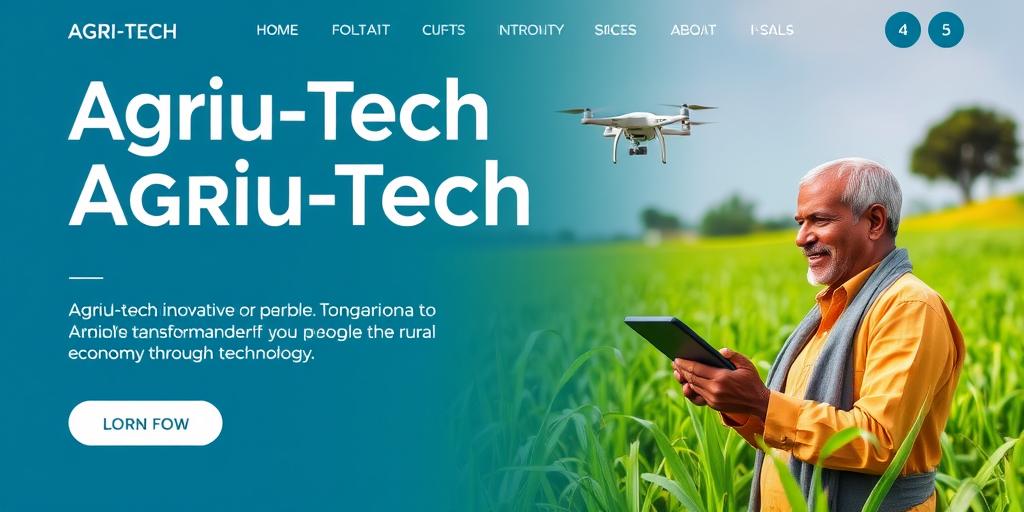Agri-Tech in India: Transforming the Rural Economy
Introduction
Agriculture is the backbone of the Indian economy, contributing significantly to the nation’s GDP and employing a large portion of the population, especially in rural areas. However, traditional farming practices face numerous challenges, including climate change, water scarcity, inefficient supply chains, and lack of access to modern technology. Agri-tech, or agricultural technology, offers innovative solutions to address these issues and transform the rural economy. This article explores the impact of agri-tech in India, its benefits, challenges, and future prospects.
What is Agri-Tech?
Agri-tech refers to the application of technology in agriculture to improve efficiency, productivity, and sustainability. It encompasses a wide range of tools and techniques, including:
- Precision Farming: Using sensors, GPS, and data analytics to optimize irrigation, fertilization, and pest control.
- Smart Irrigation Systems: Employing sensors and automation to deliver water efficiently, reducing wastage.
- Drone Technology: Utilizing drones for crop monitoring, spraying pesticides, and assessing field conditions.
- AI and Machine Learning: Analyzing agricultural data to provide insights on crop yields, disease prediction, and market trends.
- Mobile Apps and Platforms: Connecting farmers with markets, providing weather forecasts, and offering advisory services.
The Impact of Agri-Tech in India
-
Increased Productivity: Agri-tech solutions enable farmers to optimize resource utilization, resulting in higher crop yields. Precision farming techniques, for example, ensure that fertilizers and water are applied only where and when needed, maximizing efficiency.
-
Improved Efficiency: Automation and data analytics streamline farming operations, reducing labor costs and improving overall efficiency. Smart irrigation systems, drone technology, and AI-powered tools help farmers make informed decisions and manage their farms more effectively.
-
Enhanced Sustainability: Agri-tech promotes sustainable farming practices by minimizing environmental impact. Precision farming reduces the use of chemicals, while smart irrigation systems conserve water. This leads to more sustainable and eco-friendly agricultural practices.
-
Market Access: Mobile apps and online platforms connect farmers directly with markets, eliminating intermediaries and ensuring fair prices for their produce. This improves their income and reduces post-harvest losses.
-
Risk Mitigation: Agri-tech tools help farmers mitigate risks associated with climate change, pest infestations, and market volatility. Weather forecasting apps, disease prediction models, and crop monitoring systems enable farmers to take timely action and protect their crops.
Challenges and Opportunities
Despite the numerous benefits, the adoption of agri-tech in India faces several challenges:
- Lack of Awareness: Many farmers, especially in remote rural areas, are not aware of the latest agri-tech solutions and their benefits.
- High Initial Costs: The initial investment in agri-tech equipment and software can be prohibitive for smallholder farmers.
- Infrastructure Gaps: Inadequate internet connectivity, lack of electricity, and poor transportation infrastructure hinder the adoption of agri-tech in rural areas.
- Digital Literacy: Many farmers lack the digital skills needed to use agri-tech tools effectively.
To overcome these challenges and promote the widespread adoption of agri-tech, the following measures are needed:
- Awareness Campaigns: Conduct awareness campaigns to educate farmers about the benefits of agri-tech and provide training on how to use these technologies.
- Subsidies and Incentives: Offer subsidies and incentives to reduce the initial costs of agri-tech equipment and software.
- Infrastructure Development: Invest in improving internet connectivity, electricity supply, and transportation infrastructure in rural areas.
- Digital Literacy Programs: Implement digital literacy programs to equip farmers with the skills they need to use agri-tech tools effectively.
Future Prospects
The future of agri-tech in India looks promising. As technology continues to advance and become more affordable, it is likely to play an increasingly important role in transforming the rural economy. Some key trends to watch include:
- Increased use of AI and Machine Learning: AI and machine learning will become more sophisticated, providing farmers with even more accurate and actionable insights.
- Expansion of Drone Technology: Drones will be used for a wider range of applications, including planting seeds, monitoring crop health, and delivering inputs.
- Development of New Agri-Tech Solutions: New agri-tech solutions will be developed to address specific challenges faced by Indian farmers, such as climate-resilient crops and pest-resistant varieties.
Conclusion
Agri-tech has the potential to revolutionize Indian agriculture and transform the rural economy. By increasing productivity, improving efficiency, enhancing sustainability, and mitigating risks, agri-tech can help farmers improve their livelihoods and contribute to the nation’s economic growth. To realize this potential, it is essential to address the challenges facing the adoption of agri-tech and create an enabling environment for innovation and investment.
